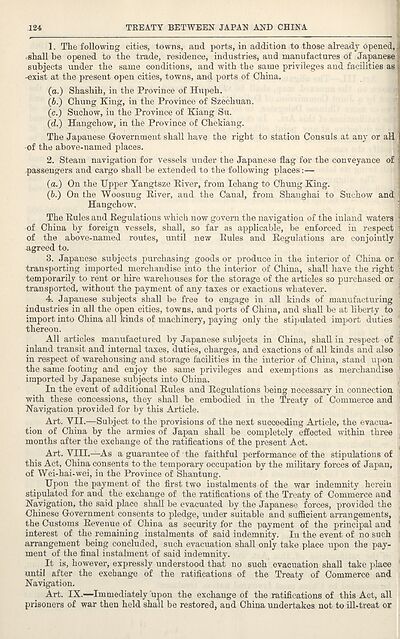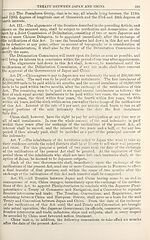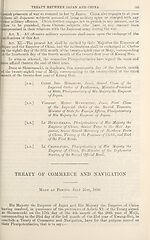1926
(176) Page 124
Download files
Complete book:
Individual page:
Thumbnail gallery: Grid view | List view

124
TREATY BETWEEN JAPAN AND CHINA
1. The following cities, towns, and ports, in addition to those already opened,]
shall be opened to the trade, residence, industries, and manufactures of Japanese;
subjects under the same conditions, and with the same privileges and facilities as
-exist at the present open cities, towns, and ports of China.
(a.) Shashih, in the Province of Hupeh.
(6.) Chung King, in the Province of Szechuan.
(c.) Suchow, in the Province of Kiang Su.
(d.) Hangchow, in the Province of Chekiang.
The Japanese Grovernment shall have the right to station Consuls at any or aH
of the above-named places.
2. Steam navigation for vessels under the Japanese flag for the conveyance of j
passengers and cargo shall be extended to the following places:—
(a.) On the Upper Yangtsze Kiver, from Ichang to Chung King.
(b.) On the Woosung Kiver, and the Canal, from Shanghai to Suchow and
Hangchow.
The Kules and Regulations which now govern the navigation of the inland waters :
of China by foreign vessels, shall, so far as applicable, be enforced in respect I
of the above-named routes, until new Kules and Regulations are conjointly j
agreed to.
3. Japanese subjects purchasing goods or produce in the interior of China or ;
transporting imported merchandise into the interior of China, shall have the right
temporarily to rent or hire warehouses for the storage of the articles so purchased or
transported, without the payment of any taxes or exactions whatever.
4. Japanese subjects shall be free to engage in all kinds of manufacturing ;
industries in all the open cities, towns, and ports of China, and shall be at liberty to 1
import into China all kinds of machinery, paying only the stipulated import duties ‘
thereon.
All articles manufactured by Japanese subjects in China, shall in respect of
inland transit and internal taxes, duties, charges, and exactions of all kinds and also ;
in respect of warehousing and storage facilities in the interior of China, stand upon j
the same footing and enjoy the same privileges and exemptions as merchandise j
imported by Japanese subjects into China.
In the event of additional Rules and Regulations being necessary in connection i
with these concessions, they shall be embodied in the Treaty of Commerce and
Navigation provided for by this Article.
Art. VII.—Subject to the provisions of the next succeeding Article, the evacua- ;
tion of China by the armies of Japan shall be completely effected within three .
months after the exchange of the ratifications of the present Act.
Art. VIII.—As a guarantee of the faithful performance of the stipulations of
this Act, China consents to the temporary occupation by the military forces of Japan,
of Wei-hai-wei, in the Province of Shantung.
Upon the payment of the first two instalments of the war indemnity herein
stipulated for and the exchange of the ratifications of the Treaty of Commerce and
Navigation, the said place shall be evacuated by the Japanese forces, provided the
Chinese Government consents to pledge, under suitable and sufficient arrangements,
the Customs Revenue of China as security for the payment of the principal and 1
interest of the remaining instalments of said indemnity. In the event of no such
arrangement being concluded, such evacuation shall only take place upon the pay¬
ment of the final instalment of said indemnity.
It is, however, expressly understood that no such evacuation shall take place 1
until after the exchange of the ratifications of the Treaty of Commerce and
Navigation.
Art. IX.—Immediately upon the exchange of the ratifications of this Act, all
prisoners of war then held shall be restored, and China undertakes not to ill-treat or
TREATY BETWEEN JAPAN AND CHINA
1. The following cities, towns, and ports, in addition to those already opened,]
shall be opened to the trade, residence, industries, and manufactures of Japanese;
subjects under the same conditions, and with the same privileges and facilities as
-exist at the present open cities, towns, and ports of China.
(a.) Shashih, in the Province of Hupeh.
(6.) Chung King, in the Province of Szechuan.
(c.) Suchow, in the Province of Kiang Su.
(d.) Hangchow, in the Province of Chekiang.
The Japanese Grovernment shall have the right to station Consuls at any or aH
of the above-named places.
2. Steam navigation for vessels under the Japanese flag for the conveyance of j
passengers and cargo shall be extended to the following places:—
(a.) On the Upper Yangtsze Kiver, from Ichang to Chung King.
(b.) On the Woosung Kiver, and the Canal, from Shanghai to Suchow and
Hangchow.
The Kules and Regulations which now govern the navigation of the inland waters :
of China by foreign vessels, shall, so far as applicable, be enforced in respect I
of the above-named routes, until new Kules and Regulations are conjointly j
agreed to.
3. Japanese subjects purchasing goods or produce in the interior of China or ;
transporting imported merchandise into the interior of China, shall have the right
temporarily to rent or hire warehouses for the storage of the articles so purchased or
transported, without the payment of any taxes or exactions whatever.
4. Japanese subjects shall be free to engage in all kinds of manufacturing ;
industries in all the open cities, towns, and ports of China, and shall be at liberty to 1
import into China all kinds of machinery, paying only the stipulated import duties ‘
thereon.
All articles manufactured by Japanese subjects in China, shall in respect of
inland transit and internal taxes, duties, charges, and exactions of all kinds and also ;
in respect of warehousing and storage facilities in the interior of China, stand upon j
the same footing and enjoy the same privileges and exemptions as merchandise j
imported by Japanese subjects into China.
In the event of additional Rules and Regulations being necessary in connection i
with these concessions, they shall be embodied in the Treaty of Commerce and
Navigation provided for by this Article.
Art. VII.—Subject to the provisions of the next succeeding Article, the evacua- ;
tion of China by the armies of Japan shall be completely effected within three .
months after the exchange of the ratifications of the present Act.
Art. VIII.—As a guarantee of the faithful performance of the stipulations of
this Act, China consents to the temporary occupation by the military forces of Japan,
of Wei-hai-wei, in the Province of Shantung.
Upon the payment of the first two instalments of the war indemnity herein
stipulated for and the exchange of the ratifications of the Treaty of Commerce and
Navigation, the said place shall be evacuated by the Japanese forces, provided the
Chinese Government consents to pledge, under suitable and sufficient arrangements,
the Customs Revenue of China as security for the payment of the principal and 1
interest of the remaining instalments of said indemnity. In the event of no such
arrangement being concluded, such evacuation shall only take place upon the pay¬
ment of the final instalment of said indemnity.
It is, however, expressly understood that no such evacuation shall take place 1
until after the exchange of the ratifications of the Treaty of Commerce and
Navigation.
Art. IX.—Immediately upon the exchange of the ratifications of this Act, all
prisoners of war then held shall be restored, and China undertakes not to ill-treat or
Set display mode to:
![]() Universal Viewer |
Universal Viewer | ![]() Mirador |
Large image | Transcription
Mirador |
Large image | Transcription
Images and transcriptions on this page, including medium image downloads, may be used under the Creative Commons Attribution 4.0 International Licence unless otherwise stated. ![]()
| Asian directories and chronicles > 1926 > (176) Page 124 |
|---|
| Permanent URL | https://digital.nls.uk/196490461 |
|---|
| Attribution and copyright: |
|
|---|---|
| Description | Volumes from the Asian 'Directory and Chronicle' series covering 1917-1941, but missing 1919 and 1923. Compiled annually from a multiplicity of local sources and research. They provide listings of each country's active corporations, foreign residents and government agencies of all nationalities for that year, together with their addresses. Content includes: various treaties; coverage of conflicts; currencies and taxes; consular fees; weights and measures; public holidays; festivals and traditions. A source of information for both Western states and communities of foreigners living in Asia. Published by Hongkong Daily Press. |
|---|---|
| Shelfmark | H3.86.1303 |
| Additional NLS resources: |

